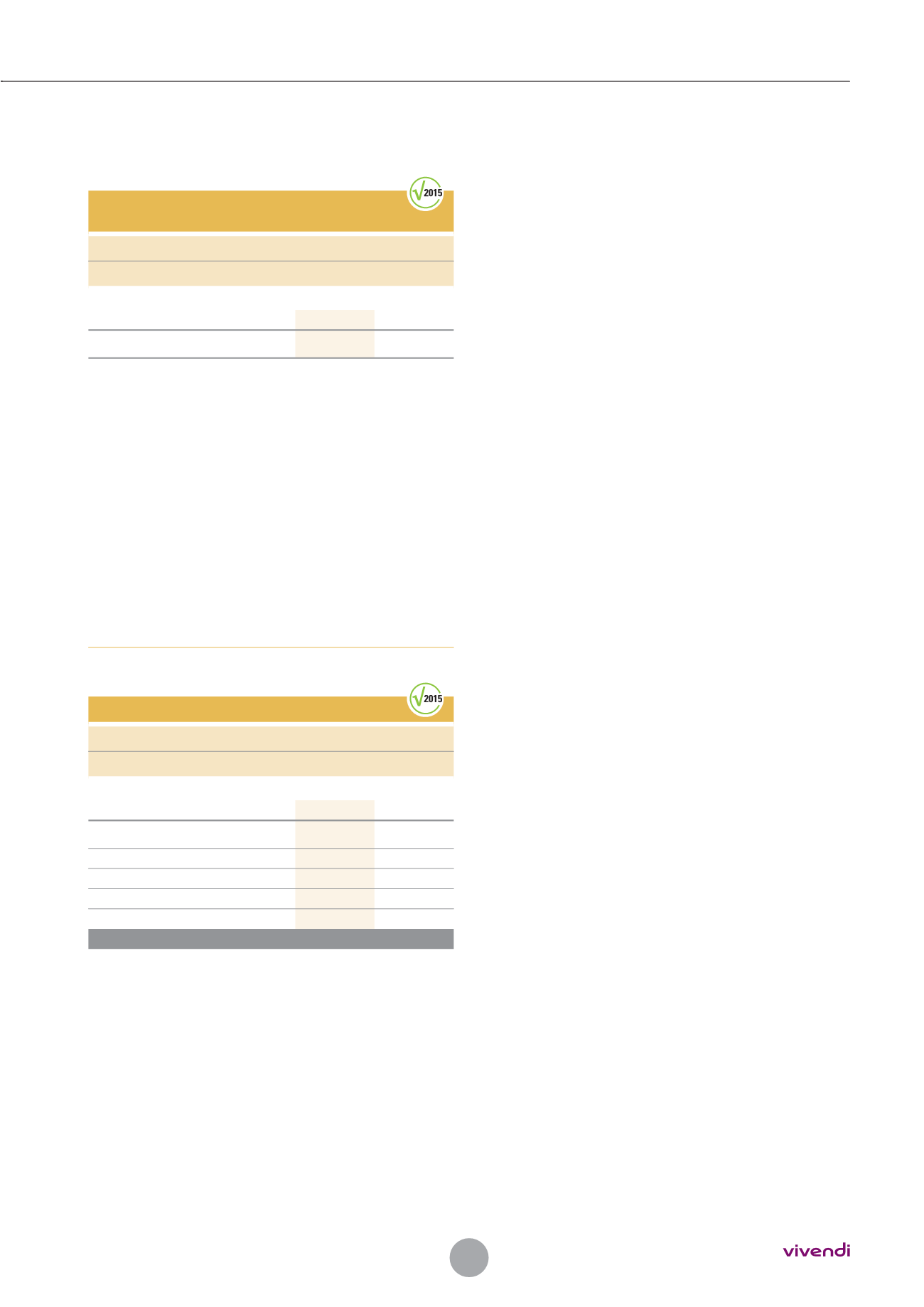

Social Indicators
Diversity and Equal Opportunities
Women on Vivendi’s Supervisory Board
PERCENTAGE OF WOMEN ON VIVENDI’S
SUPERVISORY BOARD
GRI
UNGC
OECD
G4-34, G4-LA12
6
IV, V.1.e
2015
2014
Consolidated data
46%
38%
There are 14 members of the Vivendi Supervisory Board, including
one female representative of the employee shareholders and a male
representative for the employees.
Six women sit on the Supervisory Board, representing 46% of the Board.
This does not include the employee representative in accordance with
applicable legislation (Law 2001-103 of January 27, 2011).
Vivendi has surpassed the obligation for listed companies to meet a 40%
quota for women on their boards.
Based on the percentage of women on its Supervisory Board, Vivendi
ranks high among the 120 French companies that participated in the
study
(1)
conducted by the Ministry of Women’s Rights in October 2015.
5.6.2.
EMPLOYMENT AND INTEGRATION
OF DISABLED WORKERS
Workers with Disabilities in France
WORKERS WITH DISABILITIES
GRI
UNGC
OECD
G4-LA12
1, 6
IV, V.1.e
2015
2014
UMG
10
10
C+G
98
90
of which SECP
17
19
Vivendi Village
4
5
Headquarters
0
0
Total
112
105
In 2015, the number of workers with disabilities rose by 6% in Vivendi’s
business units in France. This increase was mainly due to certain
commitments made by the Canal+ Group under its successive collective
agreements.
Employment and Integration of Workers with Disabilities
The definition of a “worker with disabilities” used in this indicator is
the one defined by national legislation or, failing this, by Convention
159 of the International Labor Organization (ILO): “any individual whose
prospects of securing, retaining and advancing in suitable employment
are substantially reduced as a result of a duly recognized physical,
sensory, intellectual or mental impairment”.
◆
In the context of its corporate social responsibility, the Canal+ Group
has been committed to a sustainable policy of hiring employees
with disabilities for several years. By implementing a series of
agreements on the hiring of employees with disabilities and with
an awareness program on this topic which goes by the name
CanalHandi+, co-workers are reminded of the group’s commitments
in this area to hire, integrate and retain disabled workers in jobs, as
well as its participation in training disabled youth through internships
or work/study programs.
The agreement on employing workers with a disability currently
in force was signed for a three-year period (2013 to 2015) by all
the trade unions represented in the group, thus enhancing the
commitments already made in previous years, such as:
– hiring 20 workers with a disability between 2013 and 2015, and a
“discovery” policy for identifying young graduates with a disability
through internships and work/study programs;
– participating in recruitment forums and maintaining specific
partnerships such as
Handicafé
,
Forum Adapt
,
Tremplin
and the
GESAT (national network of workers with disabilities)’s fair:
Osons
Nos Compétences
;
– increasing business with the protected sector through increased
communication starting with the Purchasing department and
involving all employees;
– encouraging and assisting a significant number of employees to
report their disability, with the help of a social worker to provide
administrative support;
– empowering disabled employees and keeping them on the payroll
through various forms of assistance that have been upgraded:
•
compensated authorized leaves of absence (as part of
procedures recognizing disabled worker status, for medical care
or a disabled child who is ill),
•
technical and material support,
•
disability Universal Employment Service Checks (
Chèques
Emploi Service Universel
– CESU) funded mainly
by the company,
•
mobility assistance,
•
financing assistance provided to disabled workers within
the company;
– numerous communication initiatives carried out each year, during
National Disabled Employment Week;
– information and awareness campaigns on the Intranet, and a
disability referral agent network created among employees;
– disability awareness and training sessions held for employees and
managers; and
– HR staff and managers trained in hiring disabled workers.
◆
nc+ in Poland allows ten additional days off per year to employees
with a disability; they also benefit from special arrangements such
as a working week that is shorter than that of the company’s other
employees;
◆
UMG Germany: a “Disabled Employee Officer” is in charge of
handling the needs of disabled workers;
(1)
Study available on the Ethics and Boards website.
EXTRA-FINANCIAL INDICATORS HANDBOOK
2015
55


















